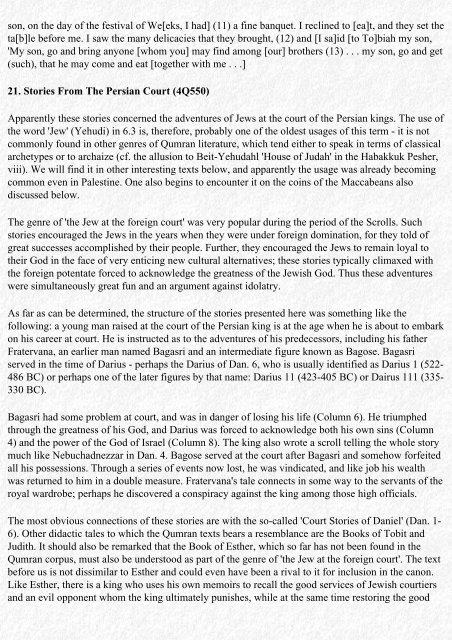Dead Sea Scrolls Uncovered - The Preterist Archive
Dead Sea Scrolls Uncovered - The Preterist Archive
Dead Sea Scrolls Uncovered - The Preterist Archive
Create successful ePaper yourself
Turn your PDF publications into a flip-book with our unique Google optimized e-Paper software.
son, on the day of the festival of We[eks, I had] (11) a fine banquet. I reclined to [ea]t, and they set the<br />
ta[b]le before me. I saw the many delicacies that they brought, (12) and [I sa]id [to To]biah my son,<br />
'My son, go and bring anyone [whom you] may find among [our] brothers (13) . . . my son, go and get<br />
(such), that he may come and eat [together with me . . .]<br />
21. Stories From <strong>The</strong> Persian Court (4Q550)<br />
Apparently these stories concerned the adventures of Jews at the court of the Persian kings. <strong>The</strong> use of<br />
the word 'Jew' (Yehudi) in 6.3 is, therefore, probably one of the oldest usages of this term - it is not<br />
commonly found in other genres of Qumran literature, which tend either to speak in terms of classical<br />
archetypes or to archaize (cf. the allusion to Beit-Yehudahl 'House of Judah' in the Habakkuk Pesher,<br />
viii). We will find it in other interesting texts below, and apparently the usage was already becoming<br />
common even in Palestine. One also begins to encounter it on the coins of the Maccabeans also<br />
discussed below.<br />
<strong>The</strong> genre of 'the Jew at the foreign court' was very popular during the period of the <strong>Scrolls</strong>. Such<br />
stories encouraged the Jews in the years when they were under foreign domination, for they told of<br />
great successes accomplished by their people. Further, they encouraged the Jews to remain loyal to<br />
their God in the face of very enticing new cultural alternatives; these stories typically climaxed with<br />
the foreign potentate forced to acknowledge the greatness of the Jewish God. Thus these adventures<br />
were simultaneously great fun and an argument against idolatry.<br />
As far as can be determined, the structure of the stories presented here was something like the<br />
following: a young man raised at the court of the Persian king is at the age when he is about to embark<br />
on his career at court. He is instructed as to the adventures of his predecessors, including his father<br />
Fratervana, an earlier man named Bagasri and an intermediate figure known as Bagose. Bagasri<br />
served in the time of Darius - perhaps the Darius of Dan. 6, who is usually identified as Darius 1 (522-<br />
486 BC) or perhaps one of the later figures by that name: Darius 11 (423-405 BC) or Dairus 111 (335-<br />
330 BC).<br />
Bagasri had some problem at court, and was in danger of losing his life (Column 6). He triumphed<br />
through the greatness of his God, and Darius was forced to acknowledge both his own sins (Column<br />
4) and the power of the God of Israel (Column 8). <strong>The</strong> king also wrote a scroll telling the whole story<br />
much like Nebuchadnezzar in Dan. 4. Bagose served at the court after Bagasri and somehow forfeited<br />
all his possessions. Through a series of events now lost, he was vindicated, and like job his wealth<br />
was returned to him in a double measure. Fratervana's tale connects in some way to the servants of the<br />
royal wardrobe; perhaps he discovered a conspiracy against the king among those high officials.<br />
<strong>The</strong> most obvious connections of these stories are with the so-called 'Court Stories of Daniel' (Dan. 1-<br />
6). Other didactic tales to which the Qumran texts bears a resemblance are the Books of Tobit and<br />
Judith. It should also be remarked that the Book of Esther, which so far has not been found in the<br />
Qumran corpus, must also be understood as part of the genre of 'the Jew at the foreign court'. <strong>The</strong> text<br />
before us is not dissimilar to Esther and could even have been a rival to it for inclusion in the canon.<br />
Like Esther, there is a king who uses his own memoirs to recall the good services of Jewish courtiers<br />
and an evil opponent whom the king ultimately punishes, while at the same time restoring the good

















